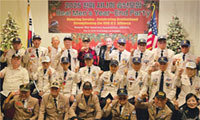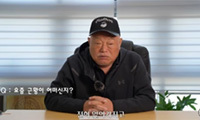The networks are the creation of a handful of North Korean defectors and South Korean human rights activists using cellphones to pierce North Korea’s near-total news blackout. To build the networks, recruiters slip into China to woo the few North Koreans allowed to travel there, provide cellphones to smuggle across the border, then post informers’ reports on Web sites.
The work is risky. Recruiters spend months identifying and coaxing potential informants, all the while evading agents from the North and the Chinese police bent on stopping their work. The North Koreans face even greater danger; exposure could lead to imprisonment ? or death.
The result has been a jumble of sometimes confirmed but often contradictory reports. Some have been important; the Web sites were the first to report the outrage among North Koreans over a drastic currency revaluation late last year. Other articles have been more prosaic, covering topics like whether North Koreans keep pets and their complaints about the price of rice.
But the fact that such news is leaking out at all is something of a revolution for a brutally efficient gulag state that has forcibly cloistered its people for decades . “In an information vacuum like North Korea, any additional tidbits ? even in the swamp of rumors ? is helpful,” said Nicholas Eberstadt, a scholar at the American Enterprise Institute who has chronicled the country’s economic and population woes for decades.
“You didn’t used to be able to get that kind of information,” he said of the reports on the currency crisis. “It was fascinating to see the pushback from the lower levels” of North Korean society. Taken together, the now-steady leak of “heard in Korea” news is factoring into ever swirling intelligence debates about whether there is a possibility of government collapse .
The news the informants are spiriting out is not likely to answer the questions about the North’s nuclear program or leadership succession that the United States cares about most.
As one senior American intelligence official put it, “You’re not going to find the North Korean uranium project from these guys.” So the traditional methods of intelligence collection ? using satellite imagery, phone and computer intercepts, and informants and agents of South Korea’s intelligence service ? remain the main sources of information.
Still, the Web sites appear to have inflicted damage. North Korea’s spy agencies, which almost never admit to weaknesses, recently warned that South Korea’s “plot to overthrow our system, employing all manners and means of spying, is spreading from the periphery of our territory and deeply inland.” They vowed retaliation, especially against “human trash,” an apparent reference to the North Koreans who have betrayed their leaders’ code of silence out of principle or for pay to supplement their usually meager wages.
The informers’ networks are part of broader changes in intelligence gathering rooted in the North’s weaknesses. The first breakthrough came in the 1990s, when famine stoked by a breakdown in the socialist rationing system drove defectors out of the country and into the arms of South Korean and American intelligence agencies. The famine also led North Korea to allow traders to cross the border into China to bring home food, leaving them vulnerable to foreign agents, the news media and, most recently, activists intent on forcing change in the North.
The first of their Web sites opened five years ago; there are now five. At least three of the sites receive some financing from the United States Congress through the National Endowment for Democracy.
The Web reports have been especially eye-opening for South Koreans, providing a rare glimpse of the aptly named Hermit Kingdom untainted by their own government’s biases, whether those of the anti-Communists who present the North in the worst light or liberals who gloss over bad news for fear of jeopardizing chances at detente.
“I take pride in my work,” said Mun Seong-hwi, a defector turned Web journalist with the site Daily NK, who works with the informers and uses an alias to protect relatives he left behind. “I help the outside world see North Korea as it is.”
Mr. Mun says his informers engage in a constant game of cat and mouse with the authorities. The North Korean government can monitor cellphone calls, but tracing them is harder, so the police rove the countryside in jeeps equipped with tracking devices.
The informants call him once a week; they never give their names, and they hide the phones far from their homes.
Despite those precautions, they are sometimes caught. In March, Ha Tae-keung , who runs one of the Web sites, reported that an arms factory worker had been found with a cellphone and confessed to feeding information to South Korea. A source said the informant was publicly executed by firing squad.
David E. Sanger contributed
reporting from Washington.
By CHOE SANG-HUN
Cellphones are used to pierce North Korea’s news blackout. Mun Seonghwi speaks with an informant.
스마터리빙
more [ 건강]
[ 건강]이제 혈관 건강도 챙기자!
[현대해운]우리 눈에 보이지 않기 때문에 혈관 건강을 챙기는 것은 결코 쉽지 않은데요. 여러분은 혈관 건강을 유지하기 위해 어떤 노력을 하시나요?
 [ 건강]
[ 건강]내 몸이 건강해지는 과일궁합
 [ 라이프]
[ 라이프]벌레야 물럿거라! 천연 해충제 만들기
 [ 건강]
[ 건강]혈압 낮추는데 좋은 식품
[현대해운]혈관 건강은 주로 노화가 진행되면서 지켜야 할 문제라고 인식되어 왔습니다. 최근 생활 패턴과 식생활의 변화로 혈관의 노화 진행이 빨라지고
사람·사람들
more
‘러브인뮤직’ 2025 성탄 음악회 성료
러브인뮤직은 지난 20일 LA 동양선교교회(담임 김지훈 목사)에서 가진 2025 성탄 작은 음악회를 끝으로 각 지역 봉사처별 올해 활동을 마무…

한인 향군 단체들 ‘진짜사나이’ 송년 행사
6·25 참전유공자회(회장 이재학)와 육군협회(회장 최만규)가 공동 주최한 2025 ‘진짜사나이’ 송년모임이 지난 19일 LA 용궁식당에서 한…
“취미생활로 다진 친목… 선후배들과 만든 모교사랑…
사진러브한인 사진 동호회 사진러브(회장 크리스 고)는 13일 용수산에서 송년모임을 갖고 한 해를 마무리하는 뜻깊은 시간을 가졌다. 이날 모임에…
[홀인원] 이상원 박사
일반외과 전문의 이상원(왼쪽) 박사가 지난 9일 뉴포트비치 소재 골프장 9번 홀(152야드)에서 레스큐 클럽으로 친 샷이 그대로 홀에 빨려 들…
[송년행사 게시판] 재미시인협회
재미시인협회(회장 지성심)는 오는 20일 오후 4시 가든스윗호텔에서 한 해를 마무리하며 동인지 ‘외지’ 제35집 출판 기념회와 ‘제23회 재미…
많이 본 기사
- 연말 ‘로드레이지’ 비극… 한인 총격 피살
- ICE 홈디포 급습단속에 한인 체포 2
- 성탄 연휴 폭우 ‘비상’ 주중 최대 6인치 온다
- ‘거액 탈세·통관 사기’ 한인 통관브로커 중형
- 트럼프, 건강보험사들에 “보험료 내려… 1
- ‘SNS 검증’에 비자심사 적체… “최대 12개월 지연”
- 2026년을 기다리며… 타임스퀘어 벌써 새해맞이 분위기
- 17년차에 17개 수상으로 증명했다..국민 여동생, 국민 가수, ‘국민 배우’까지 ‘아이유 천하’
- 말살되고 있는 유럽의 성탄절 전통, … 1
- ‘재미 이산가족 상봉 지원법’ 트럼프 서명
- ‘정치 손절’ 김흥국 “내년 선거 때 연락하지마..아들·딸 보기 부끄러워”
- 엡스타인 파일 공개했지만… 트럼프 사진 하루 만에 삭제
- 한인 최초 NASA 우주비행사 조니 김… “우주서 김치·밥 그리웠다”
- 냉장고 문짝 1초 만에 조립… ‘다크 팩토리’ 성큼
- 파워볼 로토 열풍 지속 오늘 잭팟 16억 달러로
- 관세로 준다던 미군 보너스 알고보니 ‘주택보조금’ 예산
- 외로운 이웃들
- 방탄소년단 정국, 또 자택 침입 피해로 몸살..50대 日 여성 경찰 입건
- 아픔 딛고 첫 대상후보.. ‘말자’ 김영희 “X밭 걷고 있다 생각했는데..”
- 미 자동차 업계… 전기차 접고 내연차로 회귀
- 연준, 올해 세 번째 금리 인하… 내 지갑엔 어떤 변화?
- “한인 세대간 갈등 극복 이렇게”… 회복 포럼
- 오늘 동지… 한인타운서 동지팥죽 함께 나누기 행사
- 대만서 ‘외로운 늑대’ 흉기 난동… 15명 사상
- [지평선] 쿠팡의 “한국말 몰라요”
- 시니어센터 ‘추첨제’로 29일 새학기 수강접수
- [조지 F. 윌 칼럼] MIT에 대한 트럼프의 무분별한 공격
- 에어프레미아 9호기 도입 중·장거리 노선에 투입
- ‘탄소배출권 수익’으로 서민주택 대거 공급
- 사우디 ‘술 판매’ 실험 고소득 외국인에 허용
- 고등학교 성적 인플레… SAT 점수 중요성 다시 부각
- 고물가에 연말 샤핑 ‘실속형’… 양말·커피·기저귀 선물
- ‘소명’이라 알아듣고
- 송성문, MLB 샌디에고행… 이정후·김혜성과 ‘히어로즈 더비’
- ‘최강’ 안세영, 왕중왕전서 시즌 11승… 최다승 타이로 피날레
- 국토장관 “영주권 추첨제도 전격 중단”
- ‘1세대 연극 스타’ 윤석화 뇌종양 투병 69세로 별세
- “태형아! 사랑해♥” 방탄소년단 뷔 韓팬들 성수동 대형 조형물→한강 선착장 5곳 생일 축하 초특급서포트
- ‘트럼프 SNS’ 모회사, 합병 발표
- 가족 이민 2개월째 전면 동결
- 특검, ‘김건희 집사’ 김예성에 징역 8년 구형… “죄질 불량”
- 간단한 혈액검사로 알츠하이머를 예측할 수 있을까
- 수주 물량 최소 750억달러… 미국 원전 특수 열린다
- “금리 인하 여지 충분” 백악관, ‘빅컷’ 재강조
- 이정후, MLB닷컴 선정 ‘2025 세계 올스타’
- “올해 미국서 AI 사유로 일자리 5… 1
- WINTER HOLIDAYS, 2025
- “아동용 스마트 장난감, 보안 취약”
- 중국 틱톡, 미 합작사 설립 합의
- 마두로 정권 더 옥죄는 美…베네수 연안서 유조선 추가 나포
1/5지식톡

-
 ☝️해외에서도 가능한 한국어 선생님…
0
☝️해외에서도 가능한 한국어 선생님…
0이 영상 하나면 충분합니다!♥️상담신청문의♥️☝️ 문의 폭주로 '선착순 상담'만 진행합니다.☎️ : 02-6213-9094✨카카오톡ID : @GOODEDU77 (@골뱅이 꼭 붙여주셔야합니다…
-
 테슬라 자동차 시트커버 장착
0
테슬라 자동차 시트커버 장착
0테슬라 시트커버, 사놓고 아직 못 씌우셨죠?장착이 생각보다 쉽지 않습니다.20년 경력 전문가에게 맡기세요 — 깔끔하고 딱 맞게 장착해드립니다!장착비용:앞좌석: $40뒷좌석: $60앞·뒷좌석 …
-
 식당용 부탄가스
0
식당용 부탄가스
0식당용 부탄가스 홀세일 합니다 로스앤젤레스 다운타운 픽업 가능 안녕 하세요?강아지 & 고양이 모든 애완동물 / 반려동물 식품 & 모든 애완동물/반려동물 관련 제품들 전문적으로 홀세일/취급하는 회사 입니다 100% …
-
 ACSL 국제 컴퓨터 과학 대회, …
0
ACSL 국제 컴퓨터 과학 대회, …
0웹사이트 : www.eduspot.co.kr 카카오톡 상담하기 : https://pf.kakao.com/_BEQWxb블로그 : https://blog.naver.com/eduspotmain안녕하세요, 에듀스팟입니다…
-
 바디프렌드 안마의자 창고 리퍼브 세…
0
바디프렌드 안마의자 창고 리퍼브 세…
0거의 새제품급 리퍼브 안마의자 대방출 한다고 합니다!8월 23일(토)…24일(일) 단 이틀!특가 판매가Famille: $500 ~ $1,000Falcon: $1,500 ~ $2,500픽업 & 배송직접 픽업 가능LA…
케이타운 1번가
오피니언
 옥세철 논설위원
옥세철 논설위원말살되고 있는 유럽의 성탄절 전통, 그 원인은…

외로운 이웃들
 조지 F·윌 워싱턴포스트 칼럼니스트
조지 F·윌 워싱턴포스트 칼럼니스트 [조지 F. 윌 칼럼] MIT에 대한 트럼프의 무분별한 공격
 전지은 수필가
전지은 수필가 ‘소명’이라 알아듣고
 최문선 / 한국일보 논설위원
최문선 / 한국일보 논설위원[지평선] 쿠팡의 “한국말 몰라요”

잇단 총격·테러 음모… 한인타운 안전 우려

2025년, 성찰과 감사의 마무리를
 김인자 시인ㆍ수필가
김인자 시인ㆍ수필가 [금요단상] AI와 동거, 그 실체
 한영일 / 서울경제 논설위원
한영일 / 서울경제 논설위원[만화경] 웰다잉 인센티브
1/3지사별 뉴스

퀸즈장로교회 ‘사랑의 바구니’130개 이웃에 전달
퀸즈장로교회가 18일 크리스마스를 앞두고 교인들의 정성과 사랑이 듬뿍 담긴 ‘사랑의 바구니’ 130개를 소방서와 경찰서, 요양원, 선교회, 그…
시민권 박탈 착수⋯매달 200명

“이웃 돌보는 여러분이 동역자”
워싱턴성광교회(담임목사 임용우)는 18일 한인단체와 소방서‧도서관 등에 총 2만9천 달러의 성금을 전달했다. 지난 2011년부터 15년째 지역…
소기업 지원에 1천만 달러 투자

백악관 “인플레, 목표치보다 낮아…금리 더 일찍 내렸어야”
케빈 해싯 백악관 국가경제위원회(NEC) 위원장은 21일 중앙은행인 연방준비제도(Fed·연준)가 “금리를 더 일찍 내렸어야 했다”고 말했다.해…
엡스타인 파일 공개 다음날 트럼프 사진 삭제…야당서 탄핵 경고

오늘 하루 이 창 열지 않음 닫기 




















































.png)


댓글 안에 당신의 성숙함도 담아 주세요.
'오늘의 한마디'는 기사에 대하여 자신의 생각을 말하고 남의 생각을 들으며 서로 다양한 의견을 나누는 공간입니다. 그러나 간혹 불건전한 내용을 올리시는 분들이 계셔서 건전한 인터넷문화 정착을 위해 아래와 같은 운영원칙을 적용합니다.
자체 모니터링을 통해 아래에 해당하는 내용이 포함된 댓글이 발견되면 예고없이 삭제 조치를 하겠습니다.
불건전한 댓글을 올리거나, 이름에 비속어 및 상대방의 불쾌감을 주는 단어를 사용, 유명인 또는 특정 일반인을 사칭하는 경우 이용에 대한 차단 제재를 받을 수 있습니다. 차단될 경우, 일주일간 댓글을 달수 없게 됩니다.
명예훼손, 개인정보 유출, 욕설 등 법률에 위반되는 댓글은 관계 법령에 의거 민형사상 처벌을 받을 수 있으니 이용에 주의를 부탁드립니다.
Close
x